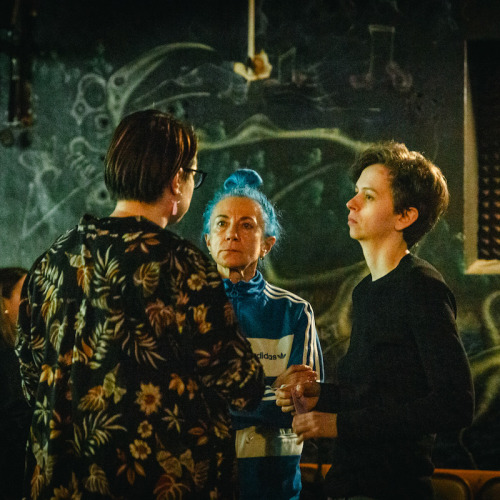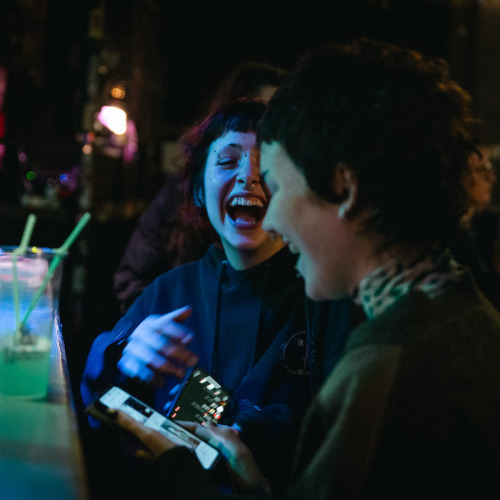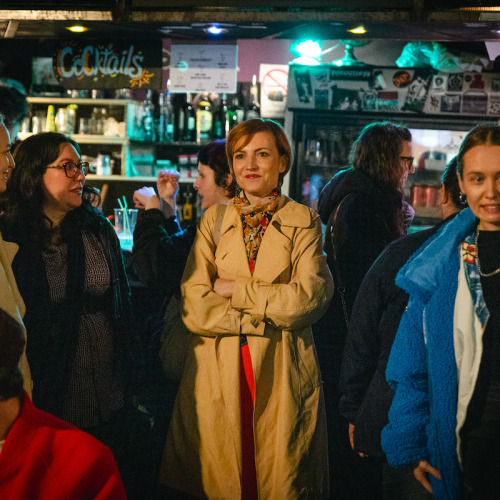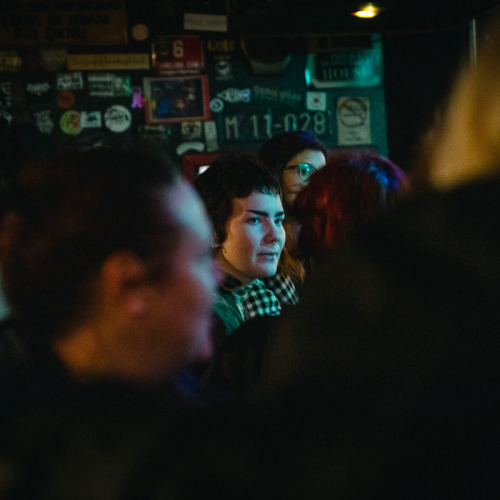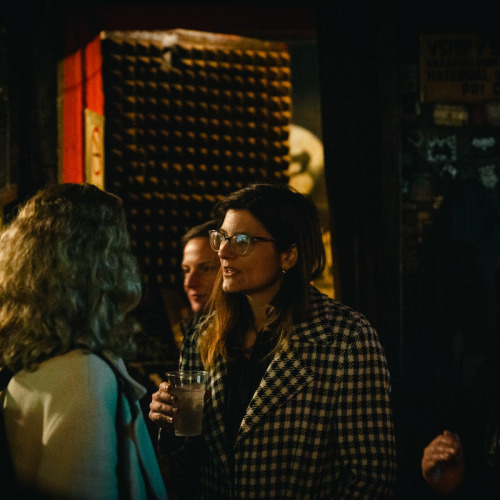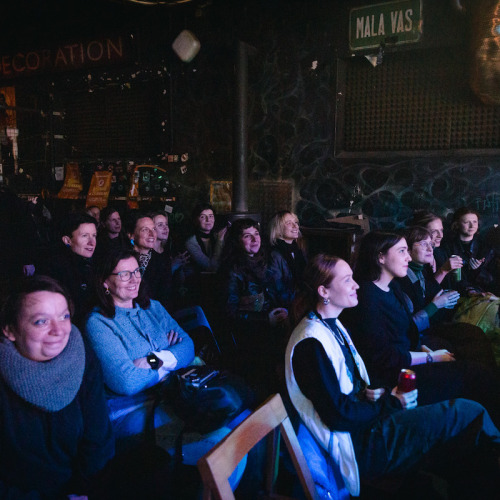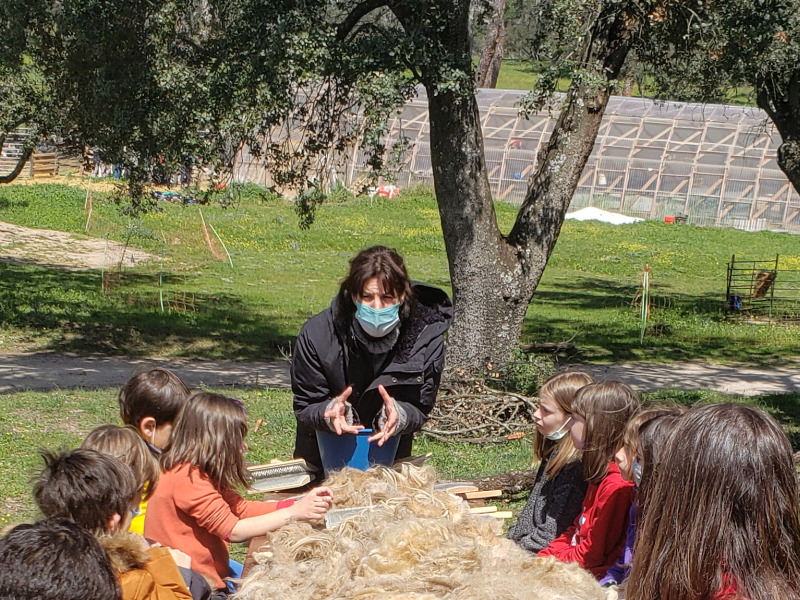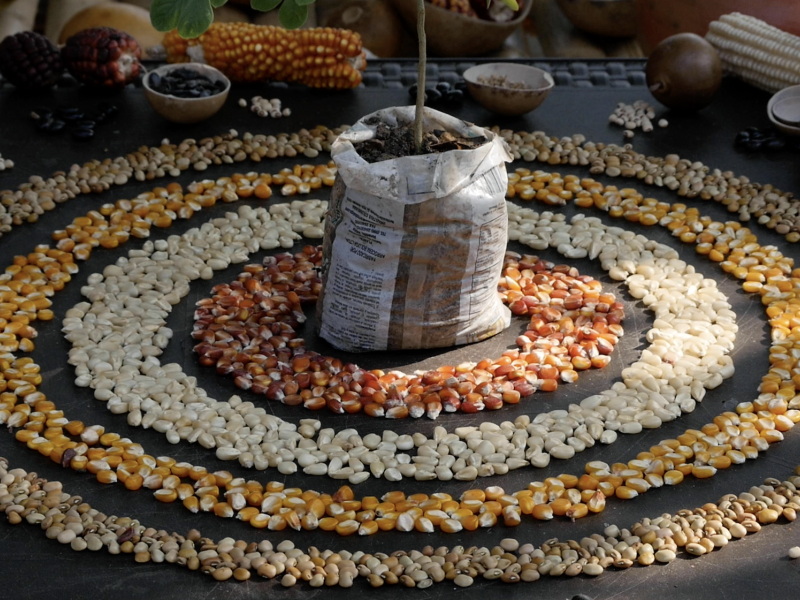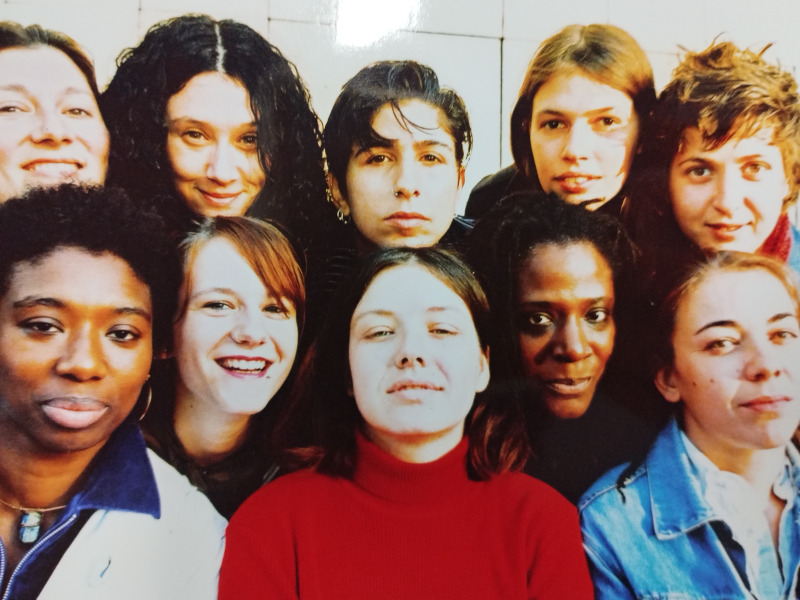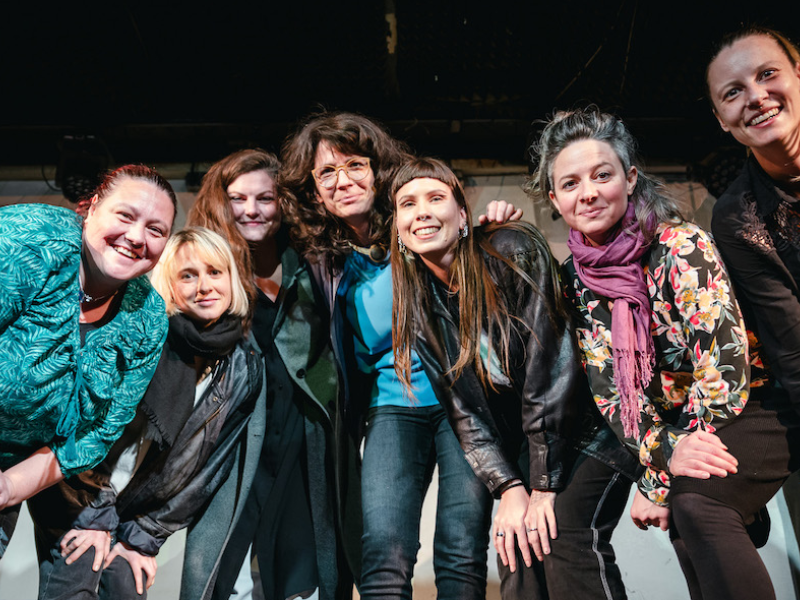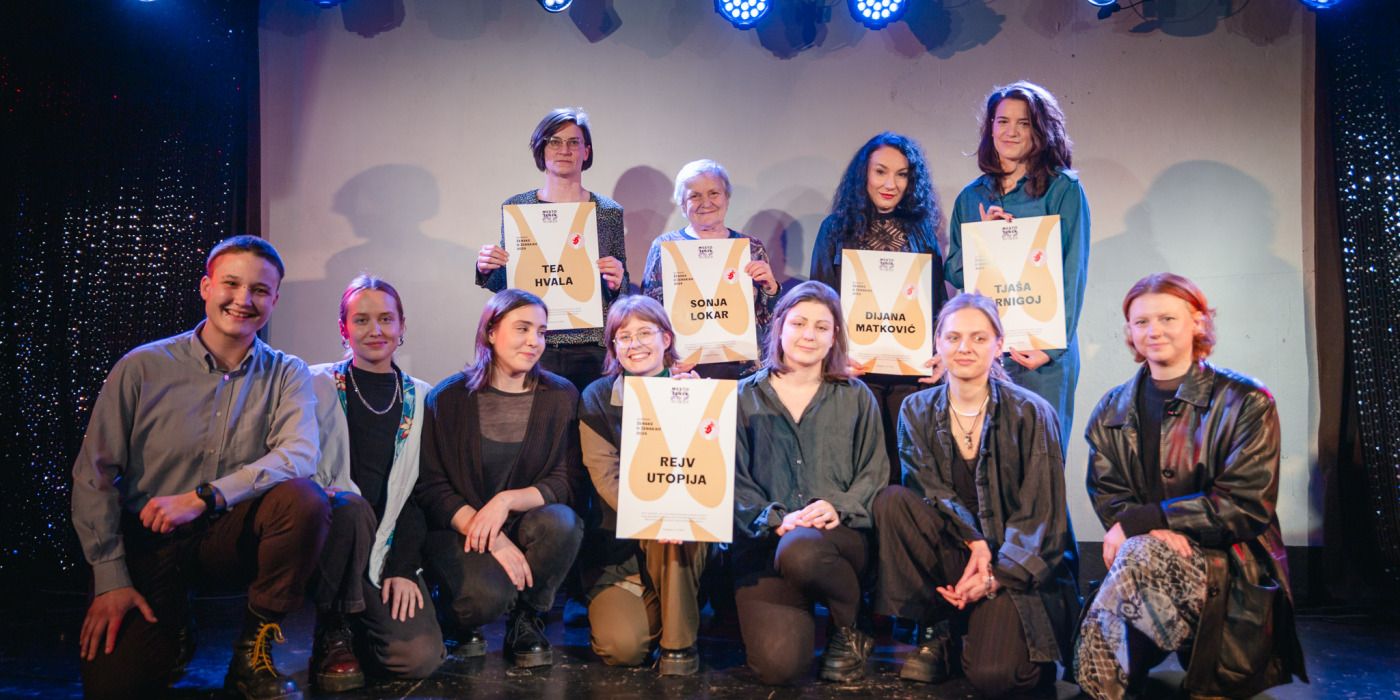
These are this year's recipients of the Women on Women Award!
This year's jury, consisting of last year's award recipients (Tita Mayer, Jasna Podreka, Nada Žgank, Tanja Matijašević (Lezbična četrt), and Metod Zupan (The Feminalz–Tatovi podob)), navigated between recently emerging initiatives, lifelong contributions, those whose work had already been nominated, those who had not yet been recognized for their longstanding efforts, those addressing current issues, and those whose struggle is always relevant.
The Women on Women Award was presented for the fifth time this year. The award is a response to the systematic erasure of women (understood to include anyone identifying with the female gender), their work, and achievements. With the award, we highlight and unveil invisible work, stories, courage, and determination of engaged groups and individuals striving for a better, more just world.
»As we read through nominees’ names, researched their work, and talked about who to bring into the spotlight, we kept coming back to a simple response: gratitude. We are thankful to each and every one of them for their lucidity to recognise the sore spots of contemporary society, for their imagination in thinking up new ways of bringing about change, for their energy to work tirelessly, and for their courage in speaking out. The selection that has our names under it is meant mostly as a loud thank you. Far from outweighing all the effort that has been put in, it is simply meant as a gesture of being noticed and heard, and, hopefully, will also bring encouragement.«
- The City of Women’s committee for the Women on Women Award 2024
JUSTIFICATIONS:
Dijana Matković
For her unwavering commitment to broadening the field of literature and strengthening both critical and political thought, the Women on Women Award goes to the writer, translator, publicist, and editor Dijana Matković. She recognises, with exceptional lucidity, the contexts that shape all social actions, positions, and fates, uncompromisingly revealing their interwovenness in hidden hierarchies and power plays. The perspective of her expression is one of the few that have the ability to both straightforwardly speak of and stem from the intersectionality of positions such as femininity, immigration, poverty, precarity, and breakthrough. Matković gives a voice to those discriminated against on the basis of gender, mental health, nationality, and class, as well as those at the intersections of systems that stratify society according to the principle of multiple discrimination, which remains scarcely mentioned and underexplored in Slovenian media.
As she reveals in her extraordinary novel Why I Don’t Write (2021), which was nominated for the Kresnik Prize (2023) and was the first Slovenian work to be included in the Books at Berlinale selection (2023), Matković has experiences with life at the intersections of different margins. It has made her fully aware of her environments, helping her remain critical of the misleading clichés that shroud systemic barriers in a veil of personal guilt.
As the dedicated editor-in-chief of the platform Disenz, she has been giving space to critical voices, especially coming from former Yugoslav countries, and insightful writers from abroad for five years. The content published on the platform reflect the sore spots of contemporary Slovenia, including sexism, ageism, artificial intelligence, and the decaying of urban spaces. As a translator, she has brought insightful writers such as Emir Kusturica, Ognjen Spahić, Oto Horvat, and others to Slovenia. In a time of growing inequalities and fake news, Dijana Matković keeps appearing either in front of the camera, at protests, or behind the keyboard, from where she challenges the monolith of dominant narratives.
Rejv utopija
The Women on Women Award goes to the collective Rejv utopija, a group of activists and party-goers who come from different professional backgrounds. We welcome their effort to make spaces meant for partying and interacting free of violence, discrimination, and harassment. In 2022, they launched workshops, field interventions in the form of awareness teams, and generally raised awareness about the importance of safe spaces. We applaud their professional and innovative approach, with which they educate collectives that organise parties and events, stressing that the culture of tolerance and denial of sexual violence in public spaces is part of the problem. Their methods not only address a critical social issue, but also offer a previously overlooked element of actively setting up safety mechanisms in nightclubs, ensuring that individuals can have a more enjoyable experience while partying. They have also published a handbook titled Priročnik za soustvarjanje varnejših prostorov nočnega življenja (A Handbook for Co-Creating Safer Nightlife Spaces).
They say that “in a utopian future, security guards would perceive us as equals, as co-creators of safe spaces,” to which we are adding that a utopian future is one where we are all as engaged and well-equipped to socialise and party as Rejv utopija is. With this Women on Women Award, we would like to support their vision, encourage their future activities, and recognise their collective effort to create a close-knit, caring community in which we all have the right to have fun.
Tjaša Črnigoj
Tjaša Črnigoj is a priceless voice in contemporary theatre, where she not only creates art, but also sheds light on important issues that are often socially and artistically ignored. Her training in theatre directing, philosophy, and comparative literature studies, as well as her current training as a psychodrama psychotherapist, reflect her commitment to diversity and a wholesome exploration of women’s issues as well as socially taboo topics in the field of sexuality and intimacy. She uses innovative theatrical language to address neglected and invisible topics like poverty, ageing, female pleasure, the struggle for reproductive rights, vaginismus, sexual consent, the sexuality of disabled individuals, and non-normative sexual practices.
She works both in the institutional and the independent theatre scene, exploring complex and often overlooked aspects of the female experience. Her works, such as the play Grannies (Babice), which deals with the poverty of older women, have been acclaimed both at home and abroad, showing her ability to draw attention to sensitive issues, both in Slovenia and internationally. Her influence transcends national borders and she was also selected by the French Institute in Slovenia to be a Jernej Šugman Fund scholarship holder for an artistic residency in Paris, where she completed the project Through the Eyes of Others (Skozi oči drugih), which focuses on transdisciplinary research.
Tjaša Črnigoj is not only a creator, but also a mentor, and collaborator who works with both other artists and organisations outside cultural-artistic circles. She is also active in the field of fighting violence against women, for example, and will lead a support group for women who have experienced violence, using the method of psychodrama therapy. This project, starting in April, is part of Društvo SOS, an association and hotline that offers support for victims of violence.
Her commitment to raising awareness about women’s issues and overlooked topics is also reflected in the lecture-performance series Sexual Education II (Spolna vzogja II) in Slovenia. It is a unique event that focuses on the neglected issues of female pleasure, consent, and sexuality. Her approach to documentary theatre and her innovative theatrical language allows for greater visibility of these topics and promotes social dialogue.
For her courageous choice of subject matter, her careful staging, and her lasting contribution to raising awareness on women’s issues, as well as for her commitment to innovative and socially relevant theatre, we present Tjaša Črnigoj with the Women on Women Award. Her contribution to art and society is outstanding and deserves acknowledgment and support.
Tea Hvala
Tea Hvala is a comparativist and cultural sociologist with a master’s degree in gender anthropology. She spreads the ideas of feminism through various roles: as a writer, editor, translator, pedagogue, curator, and organiser of artistic events, workshops, public debates, and above all, as an activist. One could say that Tea Hvala has activism in her blood. She moves with incredible ease between different spaces and spreads feminist thought both in the form of professional articles, as well as in lectures and discussions, bringing feminism closer to those who are not familiar with its theory or who would usually disregard the word itself.
At Radio Študent, she co-created the shows Sladostrastje, Prosti pad, and Sektor Ž, the first radio show about feminism in Slovenia. There are hardly any feminist organisations in which Tea did not leave her mark, the Red Dawns Festival and the City of Women, to name only two. With the City of Women, she was mostly engaged in pedagogical work. She considers the education of young generations fundamental, and so she created a quiz called #VsakDan8Marec (meaning “8 March every day”), a new version of which is carried out in cooperation with schools all over Slovenia every year on 8 March.
Tea Hvala has been involved in the alternative scene from an early age – she was part of the international music-related zine scene, and she co-organized a festival at C.M.A.K. (Cerklje Alternative Youth Club) in Cerkno called Deuje babe. The festival is dedicated to unestablished activists, musicians, painters, theorists, and others dealing with gender (in)equality in their works. For example, a public talk about hidden labour with guest dr. Majda Hrženjak, organised on the premises of the local pensioners society, managed to attract women of all generations.
Tea Hvala draws attention to the often overlooked class aspect of feminism, as she believes that if we are to talk about equal opportunities, that should mean equal socio-economic rights as well as identity and political rights. She has highlighted this topic in several high-profile professional articles and essays, published both at home and abroad. Tea Hvala writes and she writes extensively, providing in depth discussions on various topics. For example, in the essay “The Trouble with Queer” (Težave s queerom), in which he discusses the interpretations of the term ‘queer’ in Ljubljana’s LGBT+ and feminist community. She also writes about the ‘new feminism’ in Yugoslavia, feminist activism in Slovenia, union movements, and so on.
As there is not enough space to list everything here, and there are as many as 122 library index hits, we will only highlight high-profile translations: the novel Valencia by Tea Michelle (Škuc, 2010) and the study Caliban and the Witch: Women, the Body and Primitive Accumulation by Silvia Federici (Sophia, 2019). She co-edited the second edition of Virginia Woolf’s A Room of One’s Own (/*cf., 2023), to which she also contributed a foreword. She also co-edited a special issue of the magazine Gender-Apokalipsa (2015) devoted to feminist science fiction, in which she published her short story Ansibel. She has published several short stories in the magazine Literatura and on Radio Ars, as well as self-published several in the form of zines, which have been Tea’s great love since her high school years. As she herself says, in a time before the internet and social media, zines were what connected her to diverse international scenes, including a feminist one.
Tea could certainly be described as resourceful and it is true that much of her experience comes from what she calls the “do-it-yourself position, the independent scene that is based on spontaneous activism,” a form of activism she still turns to when she wants to say something important or feels called upon to react to a certain social or political situation.
Our dear Tea, it is with the greatest respect that we give you the Women on Women Award as well as thank you for everything.
Sonja Lokar
Sonja Lokar is the struggle for equality personified – without her, we would not be where we are today. She is one of the most prominent and most influential human rights activists both on a national and an international level. She is actively involved in different endeavours fighting violence, discrimination, inequality, and all kinds of injustices. Without wavering, she has been striving to improve the position of women in society and to keep women’s hard-won economic, political, and reproductive rights in place.
The beginnings of Sonja Lokar’s efforts for women’s rights date back to 1991, when she co-organized demonstrations in front of the parliament, with which women in Slovenia successfully defended the right to freely decide about the birth of children, and later the right to access free abortion and free contraception. After the political and economic system changed, seriously threatening the main rights women gained during socialism, she founded the Women’s Forum of Social Democrats, which she led for 10 years. During this period, the Women’s Forum successfully prevented the introduction of religious instruction in public schools, increased how many children qualified for child benefit, prevented kindergarten privatisation and the extension of maternity leave to three years, which would have pushed women out of the labour market, depriving them of economic independence.
Sonja Lokar played a key role in establishing partnerships and networks between governmental and non-governmental organisations and field movements, with the goal of strengthening the voices of women and marginalised groups. She also co-founded a women’s peace movement in the disintegrating Yugoslavia, which, due to the consequences of war in the Balkans, later became an organisation for the protection of women who were victims of war.
In her work for women’s rights, she has also been active in a wider region. For 10 years, she led a movement of progressive Balkan women for the legalisation of gender quotas at all levels of the electoral system as part of the Stability and Growth Pact. She was also a co-founder of the coalition that procured political quotas in Slovenia.
It was her initiative to establish the Women’s Lobby of Slovenia, making the Slovenian women’s movement a noticeable and equal part of the European women’s movement. In 2012, she was President of the European Women’s Lobby, an organisation bringing together over 2,000 progressive women’s organisations from the EU and countries looking to become EU members.
Sonja Lokar’s work also includes a diligent effort to maintain a strong welfare state and supporting institutions that have historically relieved women of a large part of unpaid care work. Her uncompromising public criticism is directed at policies that allow for the dismantling of the public sector, the crisis of public education, the privatisation of public health care, the underpaying feminised care work professions, and the lack of security in the field of long-term care. This year in January, as President of the Women’s Lobby of Slovenia, she became one of the co-founders of an ideologically colourful advocacy group that works towards making European elections fair for women, because it is clear that, in practice, women in Slovenia still do not have an equal right to run for office and to be elected.
For her exceptional lifelong contributions to the struggle for gender equality and women’s rights, her immeasurable contribution to the progress and empowerment of women around the world, her complete commitment to the principles of equality, and her unwavering dedication to the work for social justice, we honour with great respect Sonja Lokar with the Women on Women Award.
